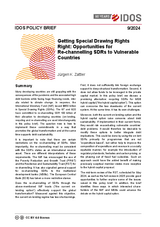Policy Brief
Getting special drawing rights right: opportunities for re-channelling SDRs to vulnerable countries
Zattler, Jürgen K.Policy Brief (9/2024)
Bonn: German Institute of Development and Sustainability (IDOS)
DOI: https://doi.org/10.23661/ipb9.2024
Many developing countries are still grappling with the consequences of the pandemic and the associated high debt burdens while facing huge financing needs, inter alia related to climate change. In response, the International Monetary Fund (IMF) issued $650 billion in Special Drawing Rights (SDRs). The G7 and G20 have committed to re-channelling SDR 100 billion of their allocation to developing countries (on-lending, recycling and re-channelling are used interchangeably in this policy brief). The question now is how to implement these commitments in a way that promotes the global transformation and at the same time supports debt sustainability. It is important to note that there are certain restrictions on the re-channelling of SDRs. Most importantly, the re-channelling must be consistent with the SDR’s status as an international reserve asset. There are different interpretations of these requirements. The IMF has encouraged the use of the Poverty Reduction and Growth Trust (PRGT) and the Resilience and Sustainability Trust (RST) for re-channelling. It has also signalled general support for re-channelling SDRs to the multilateral development banks (MDBs). The European Central Bank (ECB) has taken a more restrictive stance. Does the re-channelling of SDRs through the above-mentioned IMF trusts (“the current on-lending option”) effectively support the global transformation? Measured against this objective, the current on-lending regime has two shortcomings. First, it does not sufficiently link foreign exchange support to deep structural transformation. Second, it does not allow funds to be leveraged in the private capital market. In this policy brief, we discuss a promising alternative: recycling SDRs for MDB hybrid capital (“the hybrid capital option”). This option can overcome the two drawbacks of the current system. At the same time, it has its own challenges. Moreover, both the current on-lending option and the hybrid capital option raise concerns about debt sustainability. If implemented in their current forms, they would risk exacerbating vulnerable countries’ debt problems. It would therefore be desirable to modify these options to better integrate debt implications. This could be done by using the on-lent SDRs primarily for programmes that are not “expenditure-based”, but rather help to improve the composition of expenditure and revenue in a socially equitable manner, for example the introduction of regulatory standards, feebates and carbon pricing, or the phasing out of fossil fuel subsidies. Such an approach could have the added benefit of making previously sceptical member states more receptive to the hybrid capital proposal.
The mid-term review of the RST, scheduled for May 2024, as well as the full review in 2025 provide good opportunities to further explore some of the issues raised in this policy brief. In addition, the brief identifies three ways in which interested shareholders of the IMF and MDBs could advance the debate on the hybrid capital option.
Kontakt
Cornelia Hornschild
Koordinatorin Publikationen
E-Mail Cornelia.Hornschild@idos-research.de
Telefon +49 (0)228 94927-135
Fax +49 (0)228 94927-130
Alexandra Fante
Bibliothekarin/Open Access-Koordinatorin
E-Mail Alexandra.Fante@idos-research.de
Telefon +49 (0)228 94927-321
Fax +49 (0)228 94927-130



